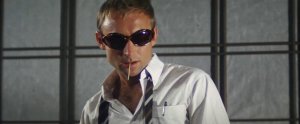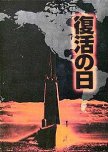A weapon that would never be used by a rational man
I've been looking forward to watching Virus for a long time, a bleak downward spiral of a film that's less focused on solving the crisis at hand but more focused on survival for the sake of it even though there's no real reason to anymore.
A US military-engineered virus, released during a plane crash, kills almost the entire human population. The only survivors are scientists and military personnel in Antarctica, who desperately try to find a cure and save what is left of the human population from further destruction.
Virus, or as it's known in its uncut form Day of Resurrection, is probably one of the best efforts by the Japanese to break into the US market where the Japanese didn't have to make any form of compromises to their filmmaking in order to appease the US. Despite not making the impact wanted at the US box office due to it being given a limited release, Virus still holds a lot of impact even to this day and honestly, is generally terrifying after having witnessed the world go through the COVID-19 pandemic.
Based on the book by Sakyo Komatsu, yes the guy behind the likes of Submersion of Japan, ESPY and Tokyo Blackout, and one of the few of his original works that's even available in English to a degree. At the time of writing this review, I haven't read the original book but I do plan to down the line, Virus is very typical of Komatsu's works with his greater focus on humanity than the disaster. While Virus is mainly based on Komatsu's original text, the film's screenplay benefits from additions by Kōji Takada, the seemingly unknown and one-time writer Gregory Knapp and director Kinji Fukasaku. It's a fantastically written dive into humanity with Fukasaku's typical perfectionist stance giving all his characters life and to an extent the virus itself.
Speaking of Fukasaku, he doesn't compromise his directorial style when switching over to a language he doesn't fully understand as would be worrying with a film of this nature. For a man mostly known for directing yakuza movies and Battle Royale, Virus brings across all the melancholy and drama you'd expect from his films and made all the more beautiful thanks to utterly gorgeous cinematography from Daisaku Kimura. Fukasaku doesn't skimp on showing us the horrific nature of a pandemic of this magnitude, mass death and destruction on a global scale, skeletons littering uninhabited cities, riots breaking out worldwide and piles of corpses being incinerated that evoke uncomfortable reminders of days gone by. Being the biggest-budgeted Japanese film of its time, it has clearly put to full effect.
The full-star cast only adds to the gravitas of the film's excellence, featuring the likes of US actors such as Glenn Ford, Robert Vaughn, Henry Silva, Chuck Connors, George Kennedy and Bo Svenson. Considering they are under the direction of a man who doesn't even speak their native language, they all perform admirably. On the Japanese side of the cast, we have the likes of Masao Kusakari whose English can be admittedly wonky at times but the effort he puts in more than makes up for it, Isao Natsuyagi, Tsunehiko Watase, Kensaku Morita and even Toshiyuki Nagashima.
Further adding to this movie's list of strengths is the incredible musical score by Teo Macero and frequent anime composer Kentarō Haneda. Employing the efforts of the London Philharmonic Orchestra, the score is simply wonderful, while it hasn't been strictly released in a large capacity there are albums floating around out there if you desire to listen to these pieces isolated like myself. The piece that opens the movie "Adieu Mon Amor" is beautiful but the entire score is worth a listen on its own.
While the film failed to take off even in Japan, make Kadokawa the Hollywood player they wanted to be or get Kinji Fukasaku the worldwide acclaim he deserved, in its full uncut version, Virus is a surprisingly powerful, criminally underrated and compelling end-of-the-world drama worthy of your attention if you like a bit more meat on the bones of a Hollywood disaster flick.
A US military-engineered virus, released during a plane crash, kills almost the entire human population. The only survivors are scientists and military personnel in Antarctica, who desperately try to find a cure and save what is left of the human population from further destruction.
Virus, or as it's known in its uncut form Day of Resurrection, is probably one of the best efforts by the Japanese to break into the US market where the Japanese didn't have to make any form of compromises to their filmmaking in order to appease the US. Despite not making the impact wanted at the US box office due to it being given a limited release, Virus still holds a lot of impact even to this day and honestly, is generally terrifying after having witnessed the world go through the COVID-19 pandemic.
Based on the book by Sakyo Komatsu, yes the guy behind the likes of Submersion of Japan, ESPY and Tokyo Blackout, and one of the few of his original works that's even available in English to a degree. At the time of writing this review, I haven't read the original book but I do plan to down the line, Virus is very typical of Komatsu's works with his greater focus on humanity than the disaster. While Virus is mainly based on Komatsu's original text, the film's screenplay benefits from additions by Kōji Takada, the seemingly unknown and one-time writer Gregory Knapp and director Kinji Fukasaku. It's a fantastically written dive into humanity with Fukasaku's typical perfectionist stance giving all his characters life and to an extent the virus itself.
Speaking of Fukasaku, he doesn't compromise his directorial style when switching over to a language he doesn't fully understand as would be worrying with a film of this nature. For a man mostly known for directing yakuza movies and Battle Royale, Virus brings across all the melancholy and drama you'd expect from his films and made all the more beautiful thanks to utterly gorgeous cinematography from Daisaku Kimura. Fukasaku doesn't skimp on showing us the horrific nature of a pandemic of this magnitude, mass death and destruction on a global scale, skeletons littering uninhabited cities, riots breaking out worldwide and piles of corpses being incinerated that evoke uncomfortable reminders of days gone by. Being the biggest-budgeted Japanese film of its time, it has clearly put to full effect.
The full-star cast only adds to the gravitas of the film's excellence, featuring the likes of US actors such as Glenn Ford, Robert Vaughn, Henry Silva, Chuck Connors, George Kennedy and Bo Svenson. Considering they are under the direction of a man who doesn't even speak their native language, they all perform admirably. On the Japanese side of the cast, we have the likes of Masao Kusakari whose English can be admittedly wonky at times but the effort he puts in more than makes up for it, Isao Natsuyagi, Tsunehiko Watase, Kensaku Morita and even Toshiyuki Nagashima.
Further adding to this movie's list of strengths is the incredible musical score by Teo Macero and frequent anime composer Kentarō Haneda. Employing the efforts of the London Philharmonic Orchestra, the score is simply wonderful, while it hasn't been strictly released in a large capacity there are albums floating around out there if you desire to listen to these pieces isolated like myself. The piece that opens the movie "Adieu Mon Amor" is beautiful but the entire score is worth a listen on its own.
While the film failed to take off even in Japan, make Kadokawa the Hollywood player they wanted to be or get Kinji Fukasaku the worldwide acclaim he deserved, in its full uncut version, Virus is a surprisingly powerful, criminally underrated and compelling end-of-the-world drama worthy of your attention if you like a bit more meat on the bones of a Hollywood disaster flick.
Was this review helpful to you?






